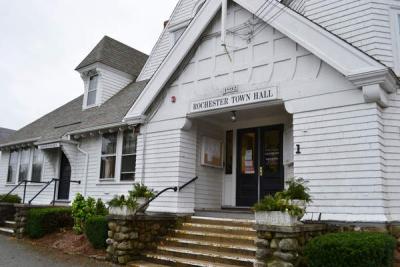Rochester revs up for tax debate
It may bring in state funds, but some residents argue that adopting the state’s Community Preservation Act tax will be more trouble than it’s worth.
On Nov. 25, Special Town Meeting voters will consider placing a question on the spring town election ballot that, if approved, would increase property tax bills by 1.5 percent. Exemptions are allowed for the elderly and low-income residents. The first $100,000 of everyone’s property value would be exempt.
Those taxes would be set aside for open space and historic preservation, recreation needs and affordable housing projects.
Act supporters include members of the Open Space Action Committee. This summer, the committee reignited the debate in Rochester seven years after voters rejected the proposal by a 26-vote margin.
Proponents say the act takes advantage of a matching grant offer. For every local dollar raised, the state awards the town 26 percent of that amount – though that percentage changes year to year.
When the program first started the match was 100 percent. As more towns adopted the act that number has fluctuated.
Open Space Committee and Planning Board member Susan Teal said Rochester is losing funds to other towns. In Massachusetts, 155 towns have adopted the act. The act has brought Dartmouth more than $2 million, Carver more than $1 million, Marion earned $800,000 and Acushnet $600,000.
Act opponents say residents can’t afford a tax increase and two boards officially oppose it.
Last month, Selectmen allowed the measure to be voted on at Special Town Meeting, but unanimously opposed its adoption.
Residents should not be subject to another tax, board members said.
The Planning Board also recommends the measure be shot down. At the board’s Nov. 8 meeting, a debate erupted that pitted Teal against other board members.
Members decried the act for being another tax increase. Arguments for the act contending it would preserve open space are unfounded, according to Chair Arnie Johnson. Johnson said he has attended Town Meeting since 1982 and support for open space is strong. “I’ve never seen this town say ‘no’ to one single project for land preservation,” he said.
Instead, board members said the tax hike would harm low income and elderly residents as well as large landholders.
According to the act, seniors who qualify as low or moderate income are exempt as are low-income residents. Johnson said that was a “low threshold” and wouldn’t help many people.
The act’s affordable housing act provision is misleading, he said. The town is not equipped to use those funds right now.
“That’s deceiving because the infrastructure is not in place for affordable housing in this town…That should not be a selling point for Rochester,” said Johnson.
If the act is adopted, a community preservation committee would be formed. That committee would develop projects to be funded with money raised through the act.
Voters would then approve or disapprove funding those proposals through Town Meeting. Residents have the option of eliminating the tax after five years, which is something no town has done, Teal noted. Johnson took issue with that. “The problem is you can’t make any changes over five years if this starts tearing the town apart in a year or two,” he said.
Teal said her committee has calculated that the average household would pay an additional $47 per year if the act is approved.
“It’s hard to imagine that an average increase of forty-seven dollars will tear the town apart,” she said. “You can go to Matt’s Blackboard Café and spend that for dinner.”















